Sport News
Arsenal’s 2024/25 Season: A Battle for Glory Amid Challenges
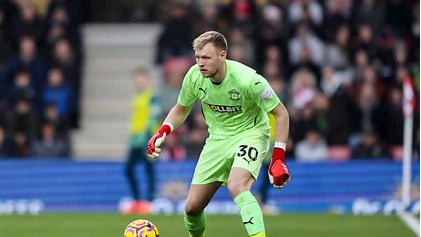 As of February 26, 2025, Arsenal Football Club has experienced a season marked by both commendable performances and notable challenges. Under the guidance of manager Mikel Arteta, the team has demonst
As of February 26, 2025, Arsenal Football Club has experienced a season marked by both commendable performances and notable challenges. Under the guidance of manager Mikel Arteta, the team has demonst
 As of February 26, 2025, Arsenal Football Club has experienced a season marked by both commendable performances and notable challenges. Under the guidance of manager Mikel Arteta, the team has demonstrated resilience and ambition, striving to remain competitive across all competitions.
As of February 26, 2025, Arsenal Football Club has experienced a season marked by both commendable performances and notable challenges. Under the guidance of manager Mikel Arteta, the team has demonstrated resilience and ambition, striving to remain competitive across all competitions.
Premier League Performance
Arsenal commenced the 2024/25 Premier League season with a series of strong performances, securing victories against Wolverhampton Wanderers (2-0) and Aston Villa (2-0) in August 2024. The team maintained momentum with wins over Leicester City (4-2) and Southampton (3-1) in September and October, respectively. However, challenges arose with draws against Brighton & Hove Albion (1-1) and Liverpool (2-2), and a narrow defeat to Newcastle United (1-0) in early November. As of late February 2025, Arsenal stands 11 points behind league leaders Liverpool, intensifying the competition for a top-four finish.
Defensive Solidity
Throughout 2024, Arsenal's defense showcased significant improvement. The team conceded 36 goals across 50 matches, averaging 0.72 goals per game—the club's best defensive record since 2005. Goalkeeper David Raya was instrumental, achieving 23 clean sheets in 46 appearances. The defensive unit, led by William Saliba, maintained consistency, with Saliba participating in 48 matches and contributing to the team's robust defensive performance.
Offensive Contributions
Offensively, Kai Havertz emerged as a pivotal figure, leading the team's scoring chart with 21 goals in 48 appearances. Bukayo Saka also delivered impressive performances, recording 20 goals and providing 16 assists, culminating in 36 goal involvements—the highest for an Arsenal player since 2019. The attacking lineup, including Leandro Trossard and Gabriel Martinelli, offered depth and versatility, each contributing significantly to the team's goal tally.
Managerial Perspective
Manager Mikel Arteta has consistently expressed optimism regarding the team's prospects. Despite setbacks, including a recent 1-0 defeat to West Ham, Arteta emphasized the team's resilience and determination to contend for the Premier League title. He highlighted the squad's identical match record and goal difference with Liverpool from November to February, underscoring the competitive nature of the league. Arteta's leadership has been pivotal in navigating the team through a season fraught with injuries and suspensions.
Challenges and Outlook
Arsenal has faced disciplinary challenges, with five red cards issued this season, leading to nine matches played with a numerical disadvantage. Arteta has voiced concerns over inconsistent rule enforcement, particularly regarding delays in restarts, which he believes have adversely affected the team's title aspirations. Looking ahead, Arsenal is preparing for crucial fixtures against Nottingham Forest, Manchester United, and Chelsea. The team's focus remains on securing a top-four finish and advancing in the Champions League, with an upcoming last-16 match against PSV Eindhoven.
In summary, Arsenal's 2024/25 season has been characterized by a blend of defensive fortitude, offensive prowess, and managerial resolve. As the season progresses, the team's ability to overcome challenges and maintain consistency will be critical in achieving their objectives.
Africa Cup of Nations 2025
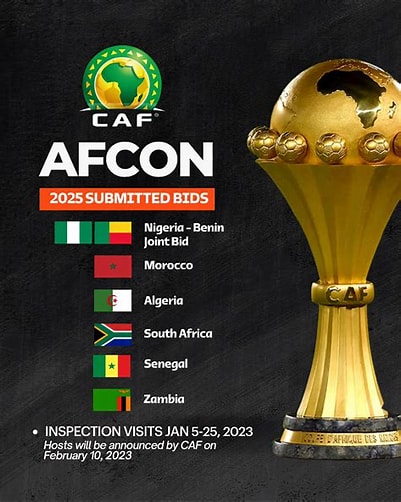 The 2025 Africa Cup of Nations (AFCON) is scheduled to take place in Morocco from December 21, 2025, to January 18, 2026. This marks the second time Morocco will host the tournament, the first being i
The 2025 Africa Cup of Nations (AFCON) is scheduled to take place in Morocco from December 21, 2025, to January 18, 2026. This marks the second time Morocco will host the tournament, the first being i
...
 The 2025 Africa Cup of Nations (AFCON) is scheduled to take place in Morocco from December 21, 2025, to January 18, 2026. This marks the second time Morocco will host the tournament, the first being in 1988. The decision to hold the tournament during these dates was influenced by FIFA's expansion of the Club World Cup to 32 teams, scheduled for June and July 2025, necessitating a shift to avoid scheduling conflicts.
The 2025 Africa Cup of Nations (AFCON) is scheduled to take place in Morocco from December 21, 2025, to January 18, 2026. This marks the second time Morocco will host the tournament, the first being in 1988. The decision to hold the tournament during these dates was influenced by FIFA's expansion of the Club World Cup to 32 teams, scheduled for June and July 2025, necessitating a shift to avoid scheduling conflicts.
The tournament will feature 24 teams competing across nine venues in six cities: Agadir, Casablanca, Fez, Marrakesh, Rabat, and Tangier. Notably, Ghana, a four-time AFCON champion, failed to qualify for this edition, marking their first absence since 2004.
As the tournament approaches, fans and teams alike are eagerly anticipating a showcase of Africa's premier football talent on Moroccan soil.
Comprehensive Report on the Africa Cup of Nations (AFCON)
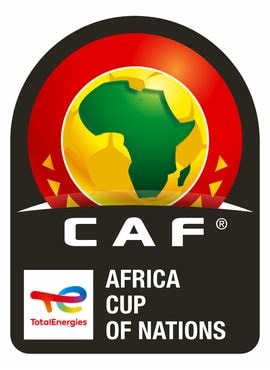
1. Introduction
The Africa Cup of Nations (AFCON) is the premier international men's football competition in Africa, organized by the Confederation of African Football (CAF). The tournament is held eve
...

1. Introduction
The Africa Cup of Nations (AFCON) is the premier international men's football competition in Africa, organized by the Confederation of African Football (CAF). The tournament is held every two years and features the top national teams from across the continent. It is regarded as the most prestigious football tournament in Africa, showcasing the continent's footballing talent and passion.
2. History of AFCON
The inaugural edition of AFCON took place in 1957 in Sudan, featuring only three teams: Egypt, Sudan, and Ethiopia. Since then, the tournament has grown significantly, both in terms of participants and global recognition.
Key Milestones in AFCON History
- 1957: The first-ever AFCON was held, and Egypt became the first champions.
- 1968: The tournament became a biennial event.
- 1992: The number of participating teams increased to 12.
- 1996: Expanded to 16 teams.
- 2019: Further expanded to 24 teams and moved from January-February to June-July.
The tournament has been a launching pad for many African football stars who later achieved global recognition in European clubs and the FIFA World Cup.
3. Format of the Tournament
AFCON follows a structured format that consists of:
- Qualification Rounds: Teams play in a series of qualifiers to earn a spot in the final tournament.
- Group Stage: The 24 teams are divided into six groups of four teams each. Each team plays three matches, and the top two teams from each group, along with the four best third-placed teams, advance to the knockout stage.
- Knockout Stage: Includes the Round of 16, Quarter-finals, Semi-finals, Third-place Playoff, and Final.
The winner of AFCON earns the title of "Champions of Africa" and qualifies for the FIFA Confederations Cup (when applicable).
4. Notable AFCON Winners & Performances
Most Successful Teams
| Country | Titles Won | Notable Years |
|---|---|---|
| Egypt | 7 | 1957, 1959, 1986, 1998, 2006, 2008, 2010 |
| Cameroon | 5 | 1984, 1988, 2000, 2002, 2017 |
| Ghana | 4 | 1963, 1965, 1978, 1982 |
| Nigeria | 3 | 1980, 1994, 2013 |
| Ivory Coast | 3 | 1992, 2015, 2023 |
| Algeria | 2 | 1990, 2019 |
| Senegal | 2 | 2021, 2023 |
Memorable AFCON Finals
- 2006: Egypt defeated Ivory Coast on penalties (4-2) in Cairo.
- 2013: Nigeria beat Burkina Faso (1-0) to win their third title.
- 2019: Algeria won after a dramatic 1-0 victory over Senegal.
- 2021: Senegal secured their first-ever title, beating Egypt in a penalty shootout.
- 2023: Ivory Coast staged a comeback to win their third AFCON title, defeating Nigeria 2-1.
5. AFCON's Impact on African Football
AFCON has played a crucial role in developing African football by:
- Providing a platform for emerging talents to showcase their skills.
- Increasing global interest in African football and boosting player transfers to top European leagues.
- Strengthening African football federations and grassroots development programs.
Many of the world's top footballers, such as Didier Drogba, Samuel Eto'o, Mohamed Salah, Sadio Mané, Jay-Jay Okocha, and Yaya Touré, gained international recognition through their performances in AFCON.
6. Challenges and Controversies
Despite its success, AFCON has faced various challenges, including:
- Scheduling conflicts: Previously held in January-February, it often clashed with European club competitions.
- Infrastructure and logistics: Some host nations struggle with stadium facilities and organization.
- Security concerns: Political instability and security issues have affected some editions.
- Refereeing controversies: Some matches have been marred by questionable officiating and disputes.
CAF continues to work on improving the tournament’s standard of refereeing, scheduling, and infrastructure.
7. Future of AFCON
AFCON continues to grow, with CAF implementing modern technology (VAR), improved stadiums, and commercial partnerships to enhance the competition.
Key developments for future AFCON tournaments include:
- More investment in African leagues to strengthen local talent.
- Improved tournament organization with better facilities and security measures.
- Greater global media coverage, attracting international sponsorship deals.
The next AFCON edition will be held in 2027, with the host country yet to be determined.
8. Conclusion
AFCON remains a symbol of African football excellence, fostering unity, national pride, and the growth of football across the continent. The tournament has evolved into one of the world's most exciting international competitions, producing legendary players and unforgettable moments. As African football continues to rise, AFCON will remain a crucial platform for showcasing the best of African talent.
Atalanta's Gasperini Criticizes Lookman After Champions League Exit, Player Responds
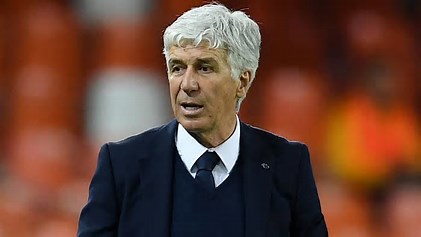 In a recent Champions League play-off match(18 February 2025), Atalanta faced a 3-1 home defeat against Club Brugge, resulting in a 5-2 aggregate elimination. During the game, forward Ademola Lookman,
In a recent Champions League play-off match(18 February 2025), Atalanta faced a 3-1 home defeat against Club Brugge, resulting in a 5-2 aggregate elimination. During the game, forward Ademola Lookman,
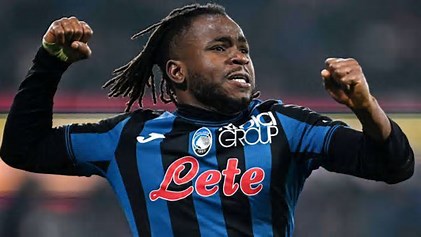
...
 In a recent Champions League play-off match(18 February 2025), Atalanta faced a 3-1 home defeat against Club Brugge, resulting in a 5-2 aggregate elimination. During the game, forward Ademola Lookman, who had entered as a halftime substitute and promptly scored, missed a crucial penalty that could have narrowed the deficit. Post-match, Atalanta's manager, Gian Piero Gasperini, publicly criticized Lookman's penalty-taking abilities, labeling him "one of the worst penalty takers I've ever seen."
In a recent Champions League play-off match(18 February 2025), Atalanta faced a 3-1 home defeat against Club Brugge, resulting in a 5-2 aggregate elimination. During the game, forward Ademola Lookman, who had entered as a halftime substitute and promptly scored, missed a crucial penalty that could have narrowed the deficit. Post-match, Atalanta's manager, Gian Piero Gasperini, publicly criticized Lookman's penalty-taking abilities, labeling him "one of the worst penalty takers I've ever seen."
Gasperini expressed his displeasure, stating that Lookman was not designated to take the penalty and highlighted his poor record in training sessions. He emphasized that other players, such as Mateo Retegui and Charles De Ketelaere, were more suitable choices for the spot-kick.

In response, Lookman took to social media to express his disappointment, describing the comments as "deeply disrespectful." He clarified that he took the penalty upon instruction from the designated taker and emphasized his commitment to the team. Lookman also highlighted his previous contributions, including being named Atalanta's Player of the Season and playing a pivotal role in their Europa League triumph.
Subsequently, Gasperini addressed the situation, stating that his remarks were not intended to offend Lookman. He acknowledged the player's potential for improvement in penalty situations and compared the incident to a similar situation involving another player, suggesting his intentions were to motivate rather than criticize.
Despite the public exchange, Lookman demonstrated resilience in Atalanta's following Serie A match against Empoli, where he delivered an outstanding performance by scoring a hat-trick in a 5-0 victory.
On February 23, 2025, Atalanta secured a dominant 5-0 victory over Empoli, with Ademola Lookman delivering a standout performance. Lookman scored twice, showcasing his attacking prowess and contributing significantly to the team's success. Other notable moments included an own goal by Emmanuel Gyasi, a goal from Mateo Retegui, and a final strike by Davide Zappacosta.
This series of events underscores the complexities of player-coach dynamics and highlights how public criticism can impact team morale and individual performances.

